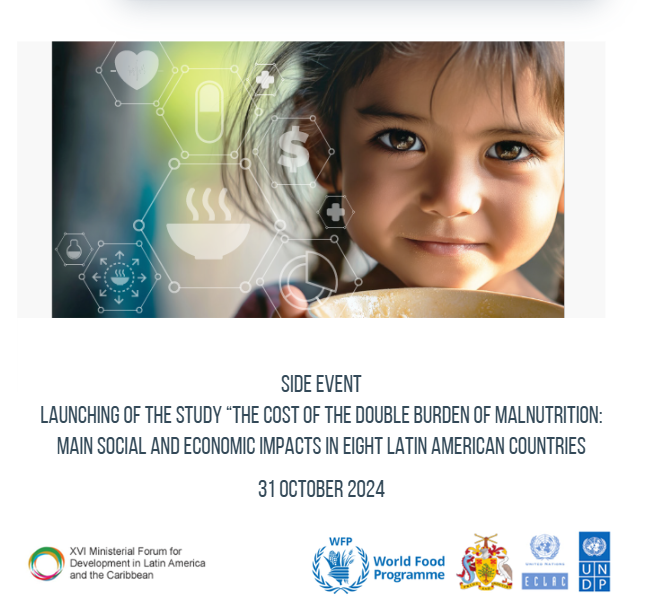Side event: launch of report "The cost of the double burden of malnutrition: main social and economic impacts in eight Latin American countries"
Work area(s)
Topic(s)
Event information

Date
31 Oct 2024, 11:30 - 13:25Event type
Participation
Background
In 2005, the World Food Programme (WFP) and the Economic Commission for Latin America (ECLAC) developed and applied the methodology for studying the Cost of Hunger with the aim of estimating the social and economic impact of malnutrition in Latin American and Caribbean (LAC) countries, and thereby informing governments and legislatures in LAC countries about the comprehensive impact of malnutrition on individuals, families and the economy of nations, in order to motivate public policies that allow for an effective response to this problem and guarantee the right to food of their population.
This study proved to be a powerful advocacy tool to influence social policies and programs in the countries where it was implemented, which motivated its adaptation and implementation in 21 African countries. Furthermore, in light of the trends shaping the nutritional landscape in Latin America and the Caribbean, WFP and ECLAC agreed to adapt and expand the original methodology to also consider overweight and obesity, and thus estimate the social and economic costs of the double burden of malnutrition. This methodology was validated and has been applied in eight countries in the region, first with a test and adaptation phase in Chile, Ecuador and Mexico, in a second phase in 2018 in Honduras, Guatemala, El Salvador and the Dominican Republic, and later in 2019 with the study in Peru.
The study estimates the effects and costs of malnutrition on health, education and productivity. It is based on the methodology designed to estimate the impacts and costs of childhood malnutrition and overweight and obesity in adults, using an inductive approach based on internationally accepted and validated relative risks. To do so, official data are used based on administrative records, health surveys and interviews with specialists, as well as the economic and demographic databases available at ECLAC. (For more details, see the technical report of the pilot study).
LAC countries are in a phase of demographic, epidemiological and nutritional transition, characterized by increased life expectancy and aging, an increase in chronic diseases and the coexistence of malnutrition due to deficiency with overweight and obesity. It should be noted that this process varies in each country. Considering the current trends, aggravated by multiple simultaneous crises and conflicts: the economic and social crisis resulting from the COVID-19 pandemic and the inflationary crisis related to the war in Ukraine, in addition to the climate and migration crisis, which are combined with deep structural inequalities. XVI Ministerial Forum for Development in Latin America and the Caribbean
This scenario and the subsequent increase in food insecurity will have a significant impact on food systems, which in turn will lead to an increase in the cost of nutritious foods. Combined with low incomes, this will reduce the affordability of healthy diets, thereby causing an increase in malnutrition in all its forms.
With this scenario and the results generated by the study of the Double Burden of Malnutrition in several countries, ECLAC and WFP have organized a space for discussion and analysis on the studies of the social and economic impact of the Double Burden in eight countries of the region that allows highlighting the social footprint generated by the double burden and advocating for actions from social policy, institutions and governance of the countries of the region.
General objective
To present results and analyse trends in the impacts of malnutrition in light of the studies on the Social and Economic Impact of the Double Burden of Malnutrition carried out in eight countries in the region, and thereby share experiences and opportunities to advocate for medium- and long-term actions to guarantee the right to healthy food in the region.
Specific objectives
- To present the results of studies on the social and economic impact of the double burden of malnutrition in eight countries in the region.
- Discuss in a high-level panel the main findings, conclusions and policy actions arising from the studies.
- Share experiences and opportunities to advance the design of nutrition-sensitive social policies in the countries of the region, their institutionality and governance, with the Ministers of Social Development (MDS), senior authorities and technicians from the Ministries of Social Development, specialists in social development, representatives of civil society and UN agencies.
Methodology
The event will begin with an introductory presentation highlighting the main findings and conclusions of the various studies in countries in the region. This will be followed by comments from the panelists and a space for questions and comments.
Format and participation
The event is aimed at government and civil society representatives and the public in Latin America and the Caribbean. Participation is in person, with the possibility of remote access via Zoom . Limited places
Programme of work
Welcome to the meeting
Alberto Arenas de Mesa – Director of the Social Development Division of ECLAC
Brian Bogart, Caribbean Country Director, World Food Programme
Presentation
Carla Mejía, Regional Nutrition Officer, WFP
Rodrigo Martínez, Senior Social Affairs Officer, ECLAC
Panelist:
Julio Demartini, Minister of Development and Social Inclusion of Peru (TBC)
Mireya Palmieri, Secretary of Food Security and Nutrition, Guatemala (virtual)
Moderated by: Amalia Palma, Researcher, ECLAC
Open discussion/closing

